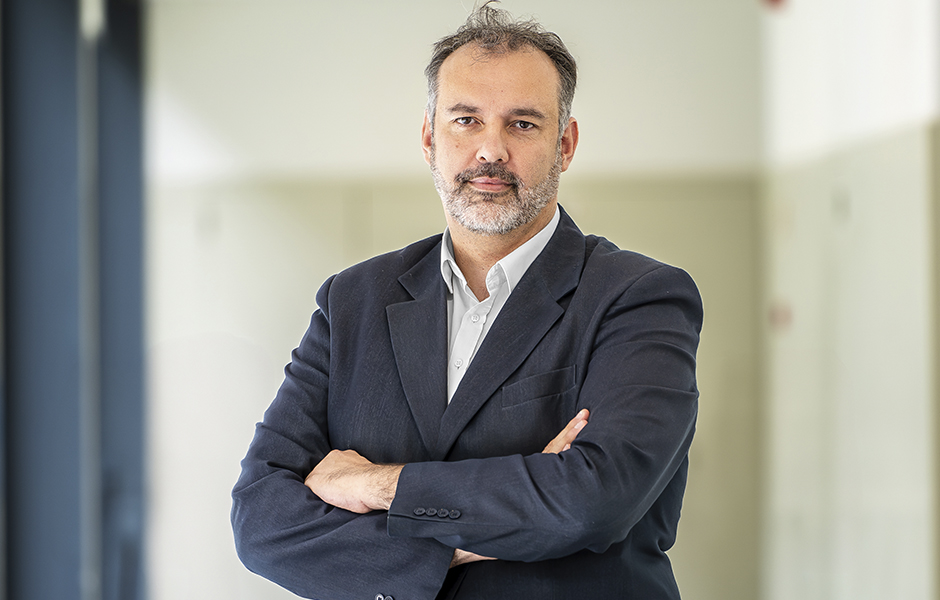Rúben Fernandes is a researcher at the new RISE-Health Research Unit, born from the merger of CINTESIS – Center for Health Technology and Services Research with UnIC – The Cardiovascular R&D Unit Unit, also at the Faculty of Medicine of the University of Porto (FMUP), MedInUP – Center for Drug Discovery and Innovative Medicines and CICS-UBI – Health Sciences Research Center at the University of Beira Interior.
He was born in Santo Ildefonso, Porto, on August 23rd, 1976. He is a researcher in the field of Biomedicine, specialized in cancer metabolism and nanomedicine. He is currently a member of the Personalized Medicine research group, of RISE-Health Thematic Line 4 – Hospital Care & Clinical Outcomes, and is a Full Professor at the Fernando Pessoa University, where he is the Director of the Clinical Studies Center at the Fernando Pessoa Teaching Hospital and coordinator of the unit he is merging with RISE, the FP-BHS (Biomedical and Health Sciences Fernando Pessoa).
As a child, he loved to draw. Until the age of 14, he was able to draw portraits of his schoolmates. He had an aptitude for the arts, but, curiously, he dreamed of becoming a genetic engineer. The path to deciding which scientific area he would pursue was “painful”. He was convinced he was going to study architecture. A book changed his mind. While on vacation when he had to decide, he read “Mutation” by Robin Cook (writer and doctor), which deals with genetic manipulation and “chimeras” well before the appearance of Dolly the sheep and cloning.
He ended up doing a bachelor’s degree in Pathological Anatomy in 1997 at the School of Health of the Polytechnic Institute of Porto (ESS-IPP). At the age of 21, he began researching cancer cytogenetics at IPATIMUP, where he spent two years and where he met the director of RISE-Health, Fernando Schmitt. He went on to work at the ICBAS Medical Cytogenetics Laboratory and the IBMC – Institute of Molecular and Cellular Biology. He earned a degree in Biology at the Faculty of Sciences of the University of Porto (FCUP) while working (2008-2013). Shortly afterward, he took the opportunity to do a PhD in Biochemistry at the University of Vigo, obtaining his degree in 2008.
He spent around 20 years at the ESS-IPP, always involved in teaching and research, especially in biotechnology and cancer metabolism, particularly in conditions of obesity, having described a metabolic process for the first time worldwide, the Inverse Warburg effect. He held various positions there, was an adjunct professor, and created the Medical and Industrial Biotechnology Laboratory (LaBMI). During the COVID-19 pandemic, he was at the forefront of the response to hundreds of thousands of users, with rapid and molecular tests for the SARS-CoV-2 virus.
He moved to the Fernando Pessoa University, where he was responsible for coordinating the UFP Health research group, and now for transitioning this critical mass to the new RISE-Health Unit, where it is distributed across six Thematic Lines. “We have researchers who already belonged to CINTESIS. It was a natural transition. So far, the feedback I’ve had is very positive. The prospects are very interesting. I’m also an enthusiast, I let myself be infected by the enthusiasm of my university,” he says.
He says he took “a boat that had already left the harbor”. It was “a shot in the dark because I was just getting to know the community and we needed to create a strategy that connected three health schools (School of Health (Polytechnic), the Faculty of Health Sciences and the School of Medicine and Biomedical Sciences), as well as the Faculty of Humanities and Social Sciences through the area of Psychology and the Faculty of Sciences and Technology” through his PhD in Environmental Health.
Ruben is an unconditional supporter of teamwork and humble enough to delegate. He confesses that it is teaching that fulfills him the most. “I love teaching, I love the students.
It’s in the students that I find the answers. I’m very curious. I try to understand the intellectual construct that leads a student to ask a question that is nonsensical or off the mark. That’s the disruptive approach, that’s the way to think outside the box,” he says.
In his connection with society, he has been involved in various academic and professional organizations, such as the Portuguese Cardiology Foundation (Northern Delegation), the Portuguese Stroke Association, the Portuguese Society of Diabetology, among others, participating in various initiatives.
What is your 1-year ambition?
At the moment, my task as a researcher is to unite, build bridges, consolidate the strategy, the embryo of which RISE-Health was the greatest catalyst. Now, I have to deliver this child, which will still have its growing pains. This means consolidating the groups that are emerging. We need to capitalize on instrumental and financial resources. We have to be able to respond to the Portuguese Foundation for Science and Technology (FCT) and A3ES – the Higher Education Assessment and Accreditation Agency, we have to be able to demonstrate solidity in various areas, which is a Herculean challenge. We have to be one in diversity. We’re all in the same boat.
What is your 10-year ambition?
I’ll be thinking about retirement (laughs). I can’t predict that. My career has shown me that everything changes every two years. We’ll have to look at the areas where we’re strongest, boost them and strengthen them.
How is life beyond research and teaching?
With the hustle and bustle of everyday life and the abundance of daily tasks, especially updating email, it’s hard to have much free time. However, whenever I can, I like to catch up on some series or movies on streaming platforms. When I have more time on my hands, I like to travel and relax by reading a good book.

